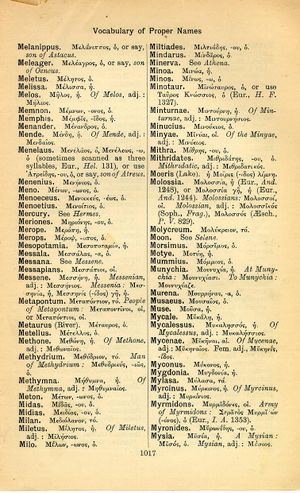Midas: Difference between revisions
τὸ κακὸν δοκεῖν ποτ' ἐσθλὸν τῷδ' ἔμμεν' ὅτῳ φρένας θεὸς ἄγει πρὸς ἄταν → evil appears as good to him whose mind the god is leading to destruction (Sophocles, Antigone 622f.)
(D_5) |
(Gf-D_5) |
||
| Line 1: | Line 1: | ||
{{WoodhouseENELnames | {{WoodhouseENELnames | ||
|Text=[[File:woodhouse_1017.jpg|thumb|link= | |Text=[[File:woodhouse_1017.jpg|thumb | ||
|link={{filepath:woodhouse_1017.jpg}}]]Μίδας, -ου, ὁ. | |||
}} | }} | ||
{{Lewis | {{Lewis | ||
Revision as of 07:42, 14 August 2017
English > Greek (Woodhouse)
Μίδας, -ου, ὁ.
Latin > English (Lewis & Short)
Mĭdas: or Mĭda, ae, m., = Μίδας,
I son of Gordius, and king of Phrygia. At his request he received from Bacchus, who wished to prove his gratitude for the hospitality Midas had accorded him, the boon that everything he touched should turn to gold. But as this extended also to food and drink, he implored the assistance of the god. The latter told him to bathe in the river Pactolus, the sands of which from that time became mixed with gold. Midas decided in favor of Pan a musical contest between him and Apollo; who in revenge provided Midas with ass's ears, Ov. M. 11, 85 sq. and 146; Hyg. Fab. 191; Cic. Tusc. 1, 48, 114; id. Div. 1, 36, 78; Mart. 6, 86, 4.—Midas is said to have discovered the use of lead and tin, Hyg. Fab. 274.
Latin > French (Gaffiot 2016)
Mĭdās,¹⁴ æ, m. (Μίδας), Midas [roi de Phrygie] : Ov. M. 11, 85 ; Cic. Tusc. 1, 114 ; Div. 1, 78.

